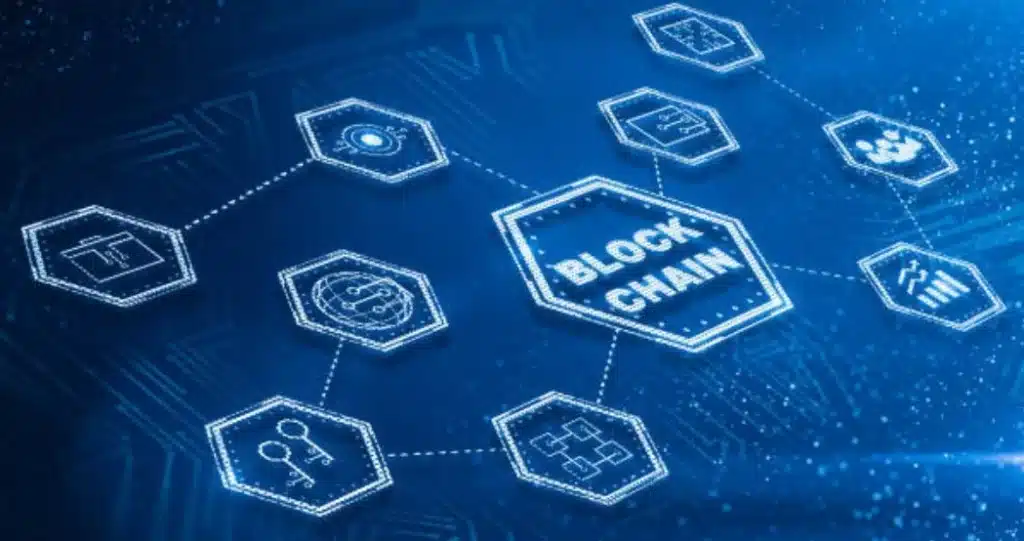A Blockchain Course enables you to acquire expertise that is highly sought after in companies across all sectors. Find out everything you need to know about this new technology, and how to become a professional.
Blockchain technology is set to revolutionize every industry. According to the World Economic Forum, 18% of global GDP will be blockchain-based by 2025.
As a result, new professions such as Blockchain developer are in high demand in companies. Taking a specialized training course can open up a wide range of career opportunities.
What is blockchain?
Blockchain is a software that enables a network of computers to connect to each other directly without intermediaries.
It establishes a decentralized, distributed network of computers, through which values can be sent, exchanged or stored instantly, securely and cost-effectively.
Data is copied to multiple nodes, each of which runs a copy of the blockchain. What’s more, the data is stored in an immutable form.
In this way, the Blockchain eliminates the risk of losing digital records. It also reduces the risk of documents being altered, or becoming inaccessible if one of the nodes fails.
Simply put, a blockchain is a chain of blocks. Data is stored on these blocks, and blocks are accumulated and secured as transactions continue to be carried out on the network.
Blocks are linked together by the chain, preventing the loss of transaction history. In addition, each block is time-stamped, indicating the number of completed transactions.

Why take a blockchain course?
Businesses are increasingly interested in Blockchain, and see this forward-looking technology as a way to secure transactions. The global Blockchain market is estimated at $7.18 billion in 2022, and is expected to reach $163.83 billion in 2029.
As a result, new professions are emerging around architecture, development or project management related to this technology. On average, the annual salary of a blockchain developer is $68,000, and can reach $150,000 for the top experts.
However, becoming a blockchain professional requires technical skills. That’s why dedicated training courses and certifications are meeting with growing success.
A certification validates the acquisition of a set of skills, and demonstrates them to employers. It allows you to stand out from other candidates when interviewing for a position in the Blockchain field.
Blockchain professions
There are already many professions linked to Blockchain, and new ones will emerge over time. At present, experts are already in great demand in companies.
Blockchain developers use MSQL, AJAX, .NET, SOAP, JavaScript and C++ to develop blockchain, decentralized applications and other software.
It also handles development tools such as Truffle, MetaMask, Geth and Ganache. Programming languages such as Node.js, WebGL and JavaScript are also essential.
The Blockchain engineer is responsible for creating and planning the Blockchain infrastructure, creating decentralized applications and training employees. He or she is proficient in Java, Oracle, Hyperledger, Python and the various blockchains such as Bitcoin and Ethereum.
A Blockchain project manager is responsible for defining the objectives, scope and purpose of the project. He or she organizes and supervises operations.
Blockchain legal consultants develop legal partnerships and “Smart Contracts”, advise on ICO (Initial Coin Offering) projects, give recommendations on crypto transactions and investments, and ensure companies’ legal compliance.
A Blockchain web designer is responsible for developing a user interface using Figma, Sketch or Photoshop. Finally, the role of the Blockchain architect is to provide structural and architectural Blockchain services.

What are the different types of Blockchain courses?
There are a wide variety of roles in the Blockchain field. However, almost all jobs require at least a basic knowledge of the technologies and how they can be used in business.
As this technology is relatively new, all training courses start with an introduction to Blockchain and the associated concepts and terms.
Some courses cover only the fundamentals, while others go into greater depth on how to design, program or secure the various parts of a Blockchain system. The most technical certifications are aimed at developers and architects.
In addition, some courses focus on more specific aspects of Blockchain. This may involve a particular programming language, or a developer specialization. This type of training is aimed at people who are already familiar with Blockchain and want to deepen their expertise.
The best Blockchain certifications
There is as yet no official Blockchain certification, as there is for the Java and Spring languages or the AWS and Microsoft Azure cloud platforms.
On the other hand, a number of independent organizations offer certifications. These include 101 Blockchains’ CEBP (Certified Enterprise Blockchain Professional).
Renowned companies such as IBM and Linux Foundation also offer industry-recognized Blockchain certifications.
As a rule, it takes just a few weeks to complete the training and obtain certification. Prices can vary widely from one certification to another.

What are the benefits of Blockchain training?
Generally speaking, a certification demonstrates a form of expertise. In the field of Blockchain, where skills are in high demand, certification training brings several advantages.
As this is a relatively new field, competition is less fierce and the ladder can be climbed more quickly.
What’s more, this technology is increasingly being adopted by companies in a variety of sectors.
Blockchain has the potential to transform other business sectors, which can further increase the demand for professionals. Obtaining a certification allows you to increase your salary.










